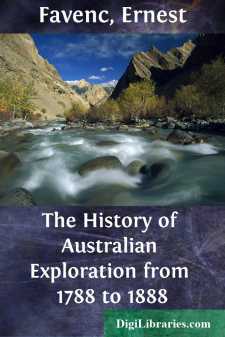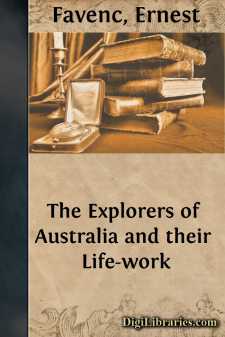Categories
- Antiques & Collectibles 13
- Architecture 36
- Art 48
- Bibles 22
- Biography & Autobiography 813
- Body, Mind & Spirit 142
- Business & Economics 28
- Children's Books 16
- Children's Fiction 13
- Computers 4
- Cooking 94
- Crafts & Hobbies 4
- Drama 346
- Education 46
- Family & Relationships 57
- Fiction 11829
- Games 19
- Gardening 17
- Health & Fitness 34
- History 1377
- House & Home 1
- Humor 147
- Juvenile Fiction 1873
- Juvenile Nonfiction 202
- Language Arts & Disciplines 88
- Law 16
- Literary Collections 686
- Literary Criticism 179
- Mathematics 13
- Medical 41
- Music 40
- Nature 179
- Non-Classifiable 1768
- Performing Arts 7
- Periodicals 1453
- Philosophy 64
- Photography 2
- Poetry 896
- Political Science 203
- Psychology 42
- Reference 154
- Religion 513
- Science 126
- Self-Help 84
- Social Science 81
- Sports & Recreation 34
- Study Aids 3
- Technology & Engineering 59
- Transportation 23
- Travel 463
- True Crime 29
The History of Australian Exploration from 1788 to 1888
by: Ernest Favenc
Description:
Excerpt
Part I
Rumours of the existence of a Southern Continent in the Sixteenth Century—JAVE and JAVE LA GRANDE—Authentic Discoveries and visits of the early Navigators—Torres sails between New Guinea and Terra Australis—Voyage of the DUYFHEN in 1606—Dirk Hartog on the West Coast, his inscribed plate—Restored by Vlaming—Afterwards by Hamelin—Nuyts on the South Coast—Wreck of the BATAVIA on Houtman's Abrolhos—Mutiny of Cornelis—Tasman's second voyage—Dampier with the Buccaneers—Second Voyage in the ROEBUCK—Last visit of the Dutch—Captain Cook—Flinders; his theory of a Dividing Strait—Plans for exploring the Interior—His captivity—Captain King—Concluding remarks.
The charm of romance and adventure surrounding the discovery of hitherto unknown lands has from the earliest ages been the lure that has tempted men to prosecute voyages and travels of exploration. Whether under the pretext of science, religion or conquest, hardship and danger have alike been undergone with fortitude and cheerfulness, in the hope of being the first to find things strange and new, and return to civilized communities with the tidings.
In the days of Spain's supremacy, after the eyes of Europe had been dazzled with the sight of riches brought from the New World, and men's ears filled with fairy-like tales of the wondrous races discovered, it was but natural that the adventurous gallants of that age should roam in search of seas yet to be won.
Some such hope of finding a land wherein the glorious conquests of Cortes and Pizarro could be repeated, brought De Quiros on a quest that led him almost within hail of our shores. What little realization of his dreams of cities rich with temples, blazing with barbaric gold, inhabited by semi-civilized people skilled in strange arts he would have found in the naked nomads of Terra Australis, and their rude shelters of boughs and bark we now know; and perhaps, it was as well for the skilful pilot that he died with his mission unfulfilled, save in fancy. His lieutenant, Torres, came nearer solving the secret of the Southern Seas, and, in fact, reports sighting hills to the southward, which—on slight foundation—are supposed to have been the present Cape York, but more probably were the higher lands of Prince of Wales Island. In all likelihood he saw enough of the natives of the Straits to convince him that no such rich pickings were to be had, as had fallen to the lot of the lucky conquerors of Mexico and Peru. He came across none of the legendary canoes from the land of gold, deep laden with the precious metal, nor sandy beaches strewn with jewels, to be had for the gathering. He puts on record what he thought of the islanders in the few terse words, that they were "black, naked and corpulent," beyond that, they do not seem to have impressed him.
Apparently they, on their part, were not impressed at being informed that they were thenceforth subjects of the King of Spain, for their dislike to Europeans appears to have increased as the unfortunate Dutch captains, Carstens and Poole, afterwards found to their cost....



